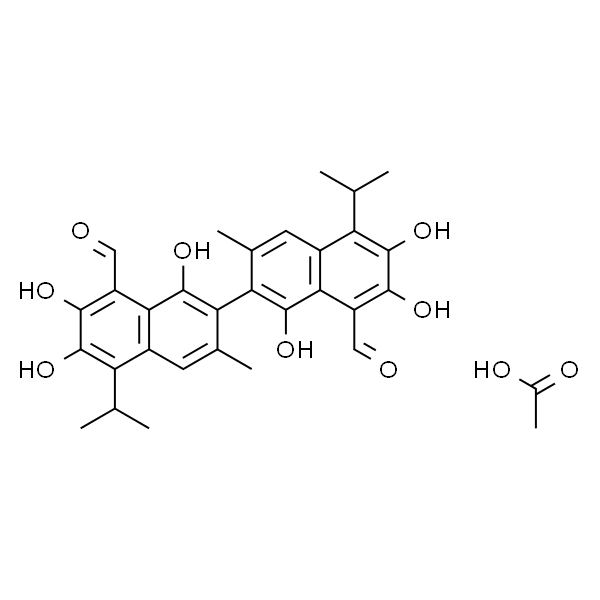| CAS |
12542-36-8 |
| Chinese Name |
醋酸棉酚 |
| English Name |
Gossypol Acetic Acid |
| Synonyms |
醋酸棉酚;棉子酚乙酸酯;Acetategossypol;Gossypolaceticacidcomplex;GOSSYPOLACETATE(RG); |
| Molecular Formula |
C32H34O10 |
| Molecular Weight |
578.61 |
| Solubility |
Soluble in DMSO |
| Purity |
HPLC≥98% |
| Appearance |
Light yellow to yellow Solid |
| Storage |
Powder:-20℃,2 years;Insolvent(Mother Liquid):-20℃,6 months;-80℃,1 year |
| EC |
EINECS 623-939-3 |
| MDL |
MFCD00058385 |
| SMILES |
OC1=C(C2=C(O)C(C(C=O)=C(O)C(O)=C3C(C)C)=C3C=C2C)C(C)=CC4=C(C(C)C)C(O)=C(O)C(C=O)=C41.O=C(O)C |
| InChIKey |
NIOHNDKHQHVLKA-UHFFFAOYSA-N |
| InChI |
InChI=1S/C30H30O8.C2H4O2/c1-11(2)19-15-7-13(5)21(27(35)23(15)17(9-31)25(33)29(19)37)22-14(6)8-16-20(12(3)4)30(38)26(34)18(10-32)24(16)28(22)36;1-2(3)4/h7-12,33-38H,1-6H3;1H3,(H,3,4) |
| PubChem CID |
227456 |
| Target Point |
Bcl-2 Family;Dehydrogenase |
| Passage |
Apoptosis;Metabolic Enzyme&Protease |
| Background |
Gossypol Acetic Acid is an inhibitor of some dehydrogenases such as lactate dehydrogenase, NAD-linked enzymes and can also bind to Bcl-xL and Bcl-2. |
| Biological Activity |
Gossypol Acetate (Pogosin, AT101; BL-193; AT-101) is a naturally occuring polyphenolic aldehyde with potential anticancer activity. It inhibit Bcl-xL and Bcl-2 proteins with Kis of 0.5-0.6 μM and 0.2-0.3 mM, respectively. It also acts as an inhibitor for various dehydrogenase enzymes. Gossypol, a known antispermatogenic agent from the cotton plant genus Gossypium, was found to inhibit yellow perch sperm motility in vitro and lactate dehydrogenase activity in spermatozoa when used in a dose-dependent manner. Gossypol has been approved to have antiproliferative and apoptosis-inducing effects on some kinds of cancer cell lines in vitro.[1] |
| Data Literature Source |
[1] Aquat Toxicol. 2000 Jun 1;49(3):181-187; Oncol Rep. 2013 Aug;30(2):731-8. |
| Unit |
Bottle |
| Specification |
5mg 10mM*1mL in DMSO 10mg |


 English
English
 中文
中文

 Manual Download
Manual Download

